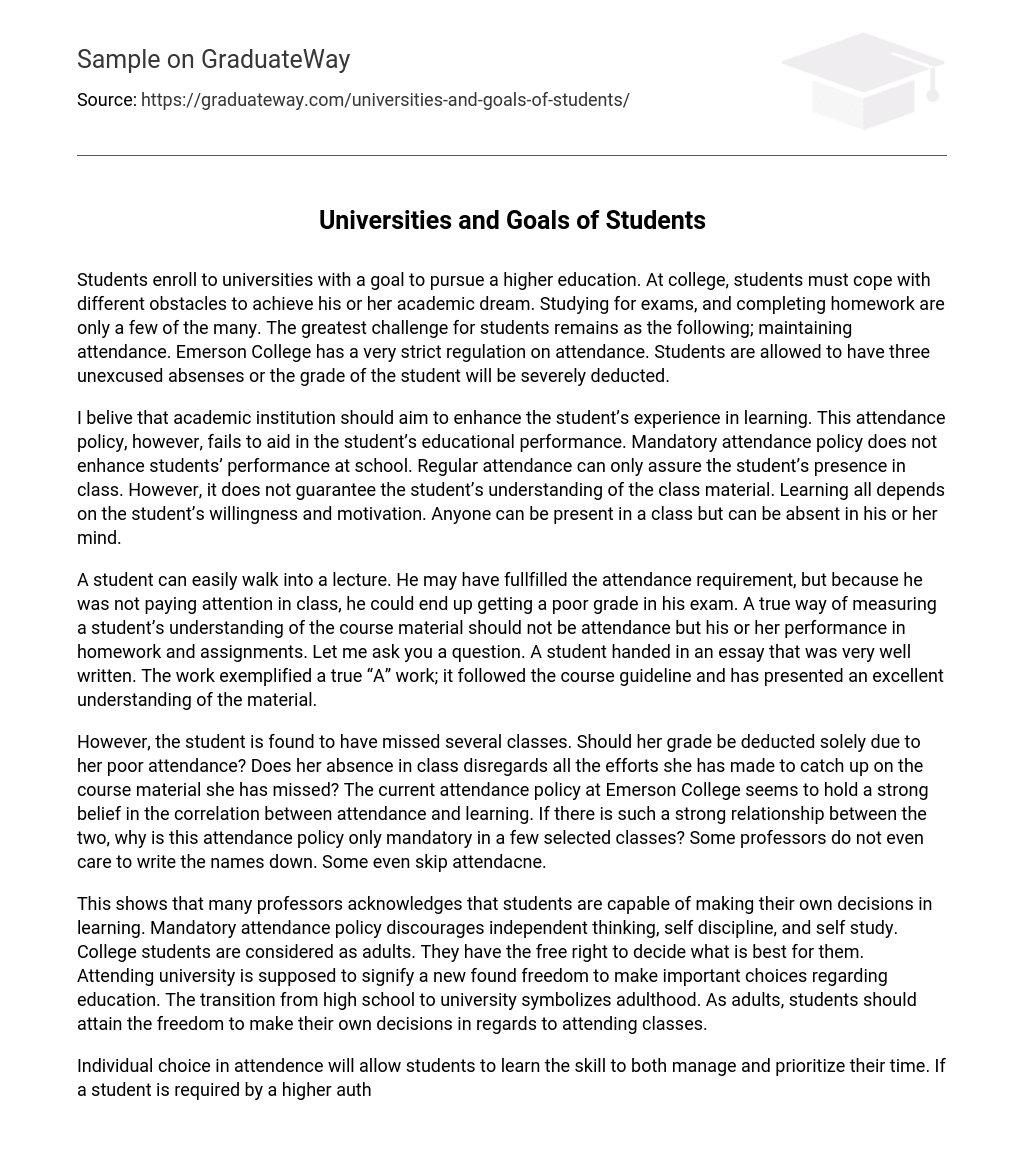Students enroll to universities with a goal to pursue a higher education. At college, students must cope with different obstacles to achieve his or her academic dream. Studying for exams, and completing homework are only a few of the many. The greatest challenge for students remains as the following; maintaining attendance. Emerson College has a very strict regulation on attendance. Students are allowed to have three unexcused absenses or the grade of the student will be severely deducted.
I belive that academic institution should aim to enhance the student’s experience in learning. This attendance policy, however, fails to aid in the student’s educational performance. Mandatory attendance policy does not enhance students’ performance at school. Regular attendance can only assure the student’s presence in class. However, it does not guarantee the student’s understanding of the class material. Learning all depends on the student’s willingness and motivation. Anyone can be present in a class but can be absent in his or her mind.
A student can easily walk into a lecture. He may have fullfilled the attendance requirement, but because he was not paying attention in class, he could end up getting a poor grade in his exam. A true way of measuring a student’s understanding of the course material should not be attendance but his or her performance in homework and assignments. Let me ask you a question. A student handed in an essay that was very well written. The work exemplified a true “A” work; it followed the course guideline and has presented an excellent understanding of the material.
However, the student is found to have missed several classes. Should her grade be deducted solely due to her poor attendance? Does her absence in class disregards all the efforts she has made to catch up on the course material she has missed? The current attendance policy at Emerson College seems to hold a strong belief in the correlation between attendance and learning. If there is such a strong relationship between the two, why is this attendance policy only mandatory in a few selected classes? Some professors do not even care to write the names down. Some even skip attendacne.
This shows that many professors acknowledges that students are capable of making their own decisions in learning. Mandatory attendance policy discourages independent thinking, self discipline, and self study. College students are considered as adults. They have the free right to decide what is best for them. Attending university is supposed to signify a new found freedom to make important choices regarding education. The transition from high school to university symbolizes adulthood. As adults, students should attain the freedom to make their own decisions in regards to attending classes.
Individual choice in attendence will allow students to learn the skill to both manage and prioritize their time. If a student is required by a higher authority to attend class, does that promote self-discipline? Success in school will be attained by students only through trial and error using their own judgment. They should not be mandated to go to class. Mandatory attendance discourages independent thinking; it encourages a sense of dependence. If students become dependent upon their professors, they will lose the ability to study individually.
It is taking away their right to make their own decisions and learn from their mistakes. Lastly, mandatory attendance policy is detrimental to the individualistic lives of collegs students. College life is not only about going to classes but coping with the real life demands. It is also a time when students learn to explore their interest by taking part in the school organizations. These group activities can sometimes take away a large portion of their time. Sometimes it is these extracurricular activities can be extremely demanding that they can take away the student from regularly attending class.
Some students have jobs they must maintain in order to simply afford going to school, while others have families they need to care for. As adults, students are at an age where they are capable of making rational decisions based on opportunity costs of their own time. Students are faced with time trade-offs, where there will be an opportunity cost for attending or not attending class. Whether students are using their in class time to study, finish an assignment, go to work or simply to relax, they are fully aware of the consequences that come with missing lectures.
Students who require extra help will make the effort to attend class, where those who do not will quite possibly still attain the same level of understanding as their peers. Not all students who want to succeed in school find class attendance as a necessary aspect of school in every given situation. Lastly, mandatory attendance policy assumes that all students have the same learning style. Not all students are auditory learners. Not all students attain information by sitting in class while listening to a professor speak. Students all have
different study habits and learning techniques, some attain information more efficiently on their own reading from a textbook. Not every student will find themselves enhancing their academic performance by attending every class. A policy mandating attendance is not in the best academic interest of all students. Mandatory attendance policy cannot be directly related to enhancing academic performance or success for all university students. Making attendance non-optional discourages self-discipline and independent thinking and overrides student’s freedom to make their own decisions.
It is unrealistic to assume all students can and will place class attendance as their first priority. It is also impractical to generalize all students as having the same learning styles. Emerson College should further consider the individual lives of the students. The school should deviate from imposing a rule that retrogade to the highschool academic system. They should acknowledge the reponsibility a college student can hold in and outside of classrooms. To truly judge a student’s understanding of the course, the school should put much more ephasis on the student’s performacen in their work.





